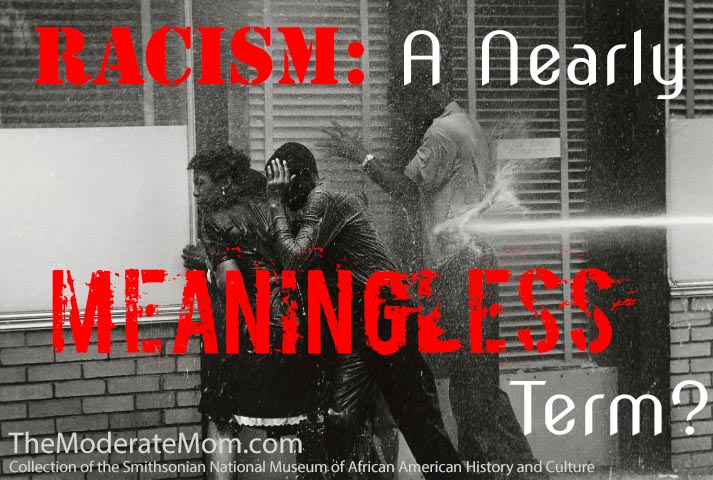
Racism: A Nearly Meaningless Term?

This started out as a post about racism because I am angry about how lightly the term is tossed around today. After I passed 1000 words, I split it in two. Then again. And again. Right now, I’m up to five posts on the subject, so it looks like it’s going to be a series.
This is something that has been bothering me. There is a lot of talk about racism in our country, and after many years – decades – of decreasing, it has done nothing but get worse over the last few years. People “play the race card” over the stupidest things! A few years ago, a black actor on the show Gray’s Anatomy said his firing was racially motivated. By Shonda Rhimes. A black woman. When his bad behavior on set and toward other cast members was common knowledge. It was ridiculous. It has reached the point that it seems to be…
A Nearly Meaningless Term.
Please note that I most certainly do NOT mean that racism does not exist. It does. My point is that the way in which the word “racism” is being used is rendering it nearly meaningless because people are quick to insist that anything referencing skin color, in any way, is racism. That is not racism. Saying a woman with ebony skin will look better in a crisp white shirt than someone pasty white skin isn’t racism. It’s reality. Some colors and shades just look better or worse depending on your skin color / tone. Our DNA and ethnicity render some of us more likely to succumb to certain diseases. That’s just cold, hard science. Neither is racism, although if you bring up either topic you run a good chance of being accused of being a racist. I heard one middle school kid say calling a white chocolate Kit-Kat bar “white” is racist, and another one who is black accused other kids of being racist for using the word “monkey” in a way even he admitted, when asked point-blank, was not intended as racist. (It was used in reference to an actual, literal monkey.) In many areas, racism has seemingly receded to the point that many, if not most, younger people truly do not understand what actual racism is, no matter what their skin color is. They truly do not understand the kind of racism where using a fire hose on someone was considered OK simply based on the color of their skin. Sure, they have heard about slavery and understand in an academic kind of way some of the evils associated with it. Many have heard about the Civil Rights Era and past discrimination from family members. But, no matter what their color, most of them simply have not ever seen that kind of racism in their lives and hearing stories isn’t the same.
What is racism?
Racism is making assumptions about people based on the color of their skin and on stereotypes, yes, but it is more than that. Racism, actual racism, is when a person believes that a person’s skin color or ancestry – their race – somehow makes them inferior to people of another race. Usually, the racist believes their race is the superior one and has a God-given right to dominate those races they believe to be inferior.
Racism, the kind that causes problems, includes actions. And yes, those actions include speech.
I was told that an older woman I knew didn’t like blacks. Since she lived near me and I saw her often as a child, she could have passed on some of that hate, but she didn’t. I never knew. And really, I don’t think she fits the definition of a racist. Her dislike was based on being beaten up regularly in high school by black teens. It seems like she was smart enough to know that not all blacks were like that, although it couldn’t make her comfortable around them because of the violence in her own past. I don’t think she qualified as a racist because she didn’t seem to think they were inferior to her, although I could be wrong since we never discussed it. The point is that even if she, herself, was racist, she didn’t act on it – not even by talking in a racist manner and passing on those horrible ideas. His dislike of, and discomfort around, black people ultimately did no harm because there were no actions, not even spoken words, that accompanied it.
Stereotypes aren’t the same as racism. Really.
Is it racist to assume that an Italian family will probably be noisier and more animated than a Japanese one? Based on the current usage of the term, absolutely. It’s a stereotype, and those are always assumed to be bad and racist. But while they are related, that isn’t really what racism is. Stereotypes aren’t meant to tell us how an individual will act. Stereotypes are about how members of a group might be expected to act. Just as not all three year old girls love princesses and tea parties, not all Texans carry guns. If you know that most Italians are more animated and talkative, then it will be easier to accept this behavior as natural rather than, say, an attempt to cover that they don’t want to talk to you. If you recognize that the quieter Japanese normally cover their mouths when they laugh, it will be harder to misread it to mean they are making fun of you, not just enjoying themselves. Like most things, stereotypes can be taken too far and cause damage. They can also turn into or be signs of racism, but the fact that any stereotype – anything at all – is seemingly considered racism on the same level as Jim-Crow-era segregation laws is ridiculous. This zero-tolerance policy is rendering “racism” a meaningless term, and that is dangerous because racism, real racism, is dangerous. The media and people in general need to stop saying things are racist unless they are, in fact racist. The person who killed nine people in their church in South Carolina was a racist. How can we be sure? Well, he said so, for starters, but also because he left a clear social media trail and a string of real-life encounters that confirm he thinks blacks are inferior to whites simply by virtue of their skin color. So when people of any color say trivial things are “racist” (calling actual monkeys “monkeys”) or use it to try to escape the consequences of their own bad behavior (the actor on Gray’s Anatomy), it chips away at the actual meaning of the word. It belittles all that the Civil Rights Era protestors fought for, and all that they went through, and it denies all the hard-won progress that has been made over the last fifty years.
